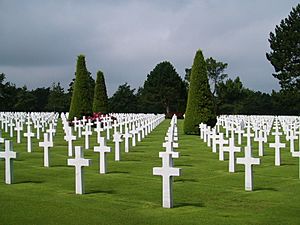Killed in action facts for kids

When people talk about soldiers in a war, you might hear the term Killed in action (KIA). This term is used by militaries to describe their soldiers, sailors, or air force members who die during a battle or fight. It means they were killed by enemy forces right there in the action.
Contents
What Does KIA Mean?
A person is called KIA if they die because of a hostile attack. This includes soldiers who might be killed by "friendly fire" during combat. Friendly fire means they were accidentally killed by their own side's weapons. However, it does not include deaths from accidents like vehicle crashes. It also does not include deaths from other non-hostile events or terrorism.
The term KIA can be used for soldiers fighting on the front lines. It also applies to naval, air, and support troops. The North Atlantic Treaty Organization (NATO) defines a combatant as KIA if they die right away. This also includes those who die from wounds or injuries before reaching a medical facility.
Other Important Terms
Besides KIA, there are other terms used to describe military deaths. These terms help explain the exact situation of how a person died during conflict.
Died of Wounds (DOW)
The term died of wounds (DOW) is different from KIA. DOW means someone was injured in battle but survived long enough to reach a medical treatment facility. They later died from their injuries there. NATO uses a similar term, DWRIA, which means "died of wounds received in action."
Presumed Killed in Action (PKIA)
PKIA stands for presumed killed in action. This term is used when military personnel are lost during a battle. They are first listed as missing in action (MIA). If they are not found after a search, they are later presumed to have died.
This often happens in naval battles or other harsh environments. In these places, it is very difficult to find and recover bodies. After World War I, many soldiers killed in action were never identified. One example was John Kipling, the son of the famous British poet Rudyard Kipling. This led to the creation of the Commonwealth War Graves Commission. This group helps remember and care for the graves of soldiers who died in war.
See also
 In Spanish: Muerto en combate para niños
In Spanish: Muerto en combate para niños

